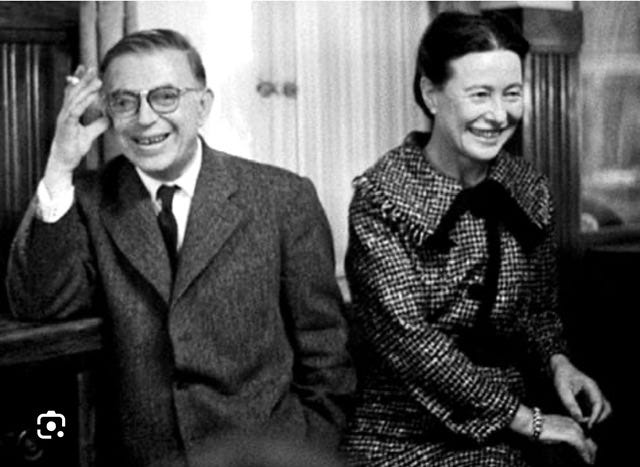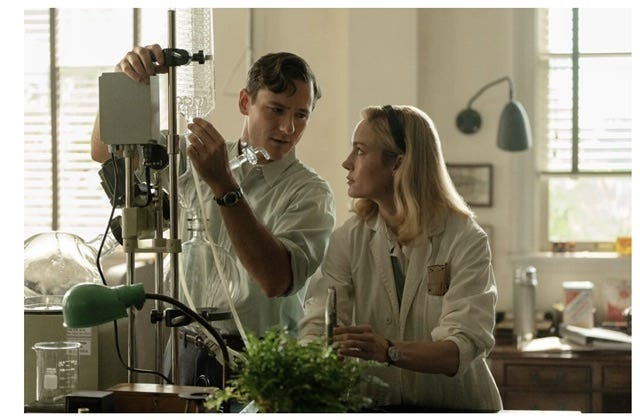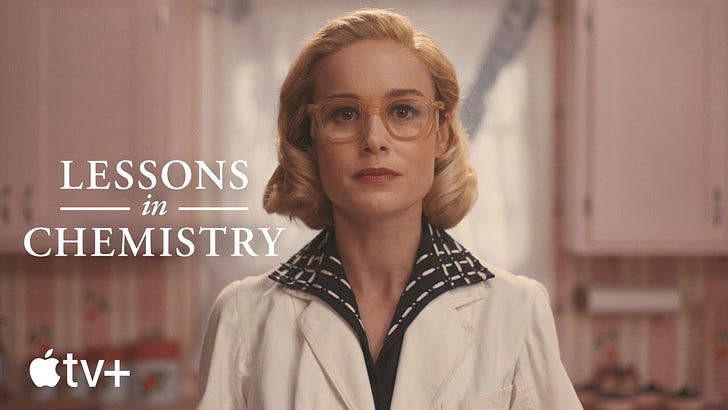Why I’m not going to write about what I was going to write about today
Plus: Sartre in a male fun-house mirror, how “Lessons in Chemistry” went astray, and Carrie Coon’s voice
I love doing criticism of news reporting, and I’m really good at it. I spend time collecting primary material: transcripts of shows, newspaper articles, discussions on social media. I approach them the way literature critics approach novels: with attention to the details of the text, the characters, the not-always-obvious subtexts and agendas. I take the words seriously, even if—especially if—the journalists themselves do not. I don’t make a claim or offer an argument unless I have what we nowadays call “receipts” (or what lawyers call “evidence”). I love doing it and I also consider it a public service in an age when the 24-hour news cycle and the race for headlines needs some watch-dogs out here.
(Sidebar: A Couple of Examples of my Posts on News Coverage:
Not Just the Fog of War: Human Suffering and the Failures of the Mainstream Media.
The Hospital The best discussion I’ve seen on MSNBC occurred October 17th on “Deadline White House” shortly after the news “broke”—or perhaps, more accurately, was set ablaze—by the BBC, The New York Times, and other widely read and trusted media sources, as well as social media.
How the “Liberal” Media Helped Make Trump Happen
There’s a commercial spot for MSNBC in which Rachel Maddow says something like “Years from now, historians will be asking how Trump could have been elected.” She puts the question out there, but she’s never attempted to answer it herself. Neither have any of the MSNBC hosts. There’s a reason. They helped elect Trump.
For weeks I’ve been collecting examples of the double-standard in news reporting of the Israeli/Hamas war, and I’d planned to write a substack piece on it last night. Eventually, I will write that piece, but not now. Because right now, it doesn’t seem possible to criticize media coverage of the war and have the “genre” understood for what it is. There is only one “genre” nowadays, it seems: for or against. Every word is seen as a weapon coming from one side or the other of a divide that gets more toxic every day. And I don’t use the term “toxic” casually. Our ability to understand what is being said, to appreciate each other’s experiences, to think through issues without becoming defensive (and often, offensive) are literally being poisoned. And they weren’t in such good shape to begin with.
There’s not much benefit to carefully taking apart a headline, only to be accused of “defending murderous Zionist terrorist extremists.” Or not caring about the lives of Palestinians. And then—because I’m human, and just as raw as everyone else—getting pulled into another kind of conversation entirely. You know, one in which we either are throwing grenades or feeling mortally wounded. Or both, at one point or another, in what has the structure of conversation but the feeling of Jets versus Sharks. All the way, to our last dying day.
I can get into it. I don’t lack the fortitude or the courage. I’ve been through fierce discursive wars before. I was a member of a Women’s Studies department for many years (sure glad I’m not now) and never was well-disciplined to prevailing theoretical or political norms. I wrote a book about Hillary Clinton that outraged Bernie Sanders supporters, got me permanently exiled from journalistic circles, and apparently turned me from a beloved teacher to whom students would turn when they had problems, to a clueless “neoliberal.” That one really hurt. But I’m old and my skin is pretty tough.
Still, there always has to be a point to entering the minefield, beyond the satisfaction of writing a good piece. And right now, I’ve lost confidence about that. I used to get an idea—often overnight, waking me up in the dark hours of morning—and immediately dive into it, without even thinking about “purpose” or “point,” or wondering about what kind of reception it would get, or what was motivating me. I assumed not everyone would like, agree, or understand. That goes with the territory of the kind of writing I do. But since October 7, I’m hyper-aware of how much the fuel of anger is feeding me, and also how likely I am to elicit blind anger from others, no matter how reasonable my arguments. I’m disturbed by the fact that no matter how well-grounded or significant what I have to say is, it’s complicit in the back-and-forth of hate that’s happening right now.
I’ll get back to news criticism, when I figure out a way to do that without second-guessing myself about why I’m doing it or what purpose it will serve. In the meantime, I’ll enjoy and support those warriors for whom doing battle in this war is the point, and who are able to do it with passion and humor—like, for example, Eve Barlow (This is Susan Sarandon she’s addressing, not me!):
And for me, there’s plenty of other things to write about.
Jean-Paul Sartre in the Upside-Down.
Jean-Paul: “When I come home, will Simone be there? I'm guessing no. I probably won't see her until morning, if I'm lucky. But that's l'amour. There is always one who loves the other more. It's never equal.”
It’s the third episode of this seasons’s Julia, and the existential philosopher is sitting at an outdoor cafe with Julia Child’s editor, mournfully complaining about his love life. And if you’ve read De Beauvoir’s autobiography—or even any description of their actual relationship—you’re wondering if you’ve entered an alternative universe.
I know this is “fiction.” But so is Woody Allen’s Midnight in Paris, and that film managed to import historical characters and do creative (and hilarious) things with them without making them unrecognizable. In fact, a huge part of the entertainment value of the film is the amazingly perfect writing and casting of the historical characters that the hero Gil Pender (Owen Wilson) meets on his midnight excursions back in time. Hemingway (Corey Stoll) Gertrude Stein (Kathy Bates) Scott Fitzgerald (Tom Hiddleston) Salvador Dali (Adrien Brody). And others. They are all look and act exactly the way you’ve imagined them. Perhaps that’s because it’s largely through caricatures, famous photographs, and quasi-fictional mythology that we “know” them. But still, it’s very clear that Allen did his research.
As for the Julia writers, Daniel Goldfarb and Christopher Keyser, I don’t know what they were thinking. Is it some kind of “wink-wink” inside joke? As in: “We know you all know it was just the other way around, we’re being playfully perverse here.” Maybe. But if so, it’s the only time the show does anything like that. And apart from his complaints about Simone, the Sartre character in Julia is, like the characters in Midnight in Paris, a parody that gets its humor by spoofing what we actually know (or think we know.) So, Julia’s Jean-Paul suffers from an ennui that, while not as hilariously on-target as Hemingway’s deadpan macho in Midnight in Paris, at least has some connection with existentialism (or its rep, anyway).
But a lovelorn Sartre, pining over De Beauvoir? Here’s the reality, as described by Lisa Appignanesi:
The young Sartre already saw himself as a Don Juan, a seducer who ruptured outworn convention, and whose presence revealed things in their fundamental light. Seduction and writing, he believed, had their source in the same intellectual process.
Late in life, he admitted that he had fantasised a succession of women for himself, each one meaning everything for a given moment. De Beauvoir had astonished him by agreeing to the experiment he had outlined. She accepted the freedom he insisted on and became its custodian…
"What we have," he said early on to De Beauvoir, "is an essential love; but it is a good idea for us also to experience contingent love affairs."….
….Yet in this lifelong relationship of supposed equals, he, it turned out, was far more equal than she was. It was he who engaged in countless affairs, to which she responded on only a few occasions with longer-lasting passions of her own. Between the lines of her fiction and what are in effect six volumes of autobiography, it is also evident that De Beauvoir suffered deeply from jealousy. She wanted to keep the image of a model life intact. There were no children. They never shared a house and their sexual relations were more or less over by the end of the war, though for much of their life and certainly at the last, they saw each other daily.
With the posthumous publication in 1988 of her letters to Sartre, a good proportion of them written during the war years when he was at the front and then a prisoner, gaps that were left out of the autobiography are filled in. What the letters express is not only De Beauvoir's overarching love for a man who is never sexually faithful to her, a man she addresses as her "dear little being" and whose work she loyally edits. They also underline the mundanity of De Beauvoir's early accommodation to his wishes, her acceptance of what many women would reject as demeaning.
Were the two male writers of Julia simply uninterested in doing any homework on this relationship? Were they too invested in sympathy for a hero of their adolescence? Or were they simply unable to imaginatively inhabit the experience of being a woman—an experience that De Beauvoir herself wrote extensively about?
“Lessons in Chemistry” Suffers From an Identity Crisis
I started out loving this series because of the heroine, Elizabeth Zott (Brie Larson.)“There’s a special place in my heart,” I wrote, “for female characters that share a certain mixture of social cluelessness, stubbornness, sureness about their abilities, unwillingness to compomise on their natures, and tender vulnerability.”
Some people—that includes me—would characterize Zott as neurodivergent. But whether or not you accept the applicability of the term to Elizabeth, it’s “her misfit nature,” as Bonnie Garmus herself says “that makes her a stand-out.” The author talks about her pleasure in creating Elizabeth for the novel:
From the very beginning, I liked writing a character who knew who she was; someone who didn’t constantly question herself or spend hours wondering what she should be. Sometimes I’d find myself marveling at her confidence: she doesn’t agonize—she acts. But with that kind of confidence comes a sort of blindness, and naturally that gets her in trouble. People react to her with a mixture of astonishment, frustration, humor, envy. Elizabeth does not have the time or inclination to people-please. She also has no room for avoidance, manipulation, lies, and fakery. Seems like a lot of extra work. Why not just state facts? Why not just tell it like it is?
There were days when I would find myself saying out loud, “You really want to say that, Zott? You really want to go there?” And she’d say, “What? Why not?” She has this streak of cluelessness mixed with a kind of fed-up impatience that I loved writing.”
It’s because Elizabeth doesn’t fit with the rest of the world that it’s so touching when she meets her soul-mate: a chemist of national renown, Calvin Evans (Lewis Pullman,) who is as socially unassimilated as Elizabeth is and, like her, is kept awake at night thinking about abiogenesis (how biological life in all its complexity arose from simple non-living matter.) They both are arrogant about their expertise but (under the surface of hyper-rationality) tender-hearted. And—oh my god—he actually takes her seriously as a scientist, and unlike his colleagues, sees the injustice (and lack of efficiency) of a world in which women are discriminated against. Especially brilliant ones like Elizabeth. (“Why would someone discriminate based on something as intellectually non-determinative as gender?” Calvin wonders.)
Partly because of the sweet chemistry between Larson and Pullman—they are both so adorable—their love affair is not just believable, but truly tragic when he‘s struck and killed by a bus. And even though Garmus says she didn’t intend to write a love story (she calls the book more a “love letter to scientists and the scientific brain”) the love relationship is what I found the least cliched, the least feminist-pedagogical, and the most moving part of the story. I applauded the series for foregrounding it in a way that the book, which gets tangled in multiple other plots and is burdened by a whole lot of anachronistic lectures about gender equality, does not, and I was delighted when the series later brings Calvin back, by recounting his childhood and then his meeting, falling in love, and life with Elizabeth, retold from his perspective. (I dreaded seeing his death again, though; it was heartbreaking all over again.)
But then. But then. The series, like the book, starts to meander everywhere all at once. Except unlike the book, which takes more time to tie up the ends, it crams the resolution of the mystery of Calvin’s life and the turnabout in Elizabeth’s—plus a baffling disappointment for her neighbor Harriet (which seems to have no point at all other than perhaps to make the point that racial inequality still exists and the system still sucks, even in this fairytale) into one final episode. Characters and plot-lines are left confusing or just hanging. And then everyone (including the apparition of Calvin) appears at a final, jolly dinner. It’s not the first time I’ve started out with enthusiasm over a series (or a movie) and then been let down by a failure of writing at the end. I guess the writers get tired. Or something.
If you’d like to read my original post on the series (there’s also a part two)
The Gilded Age and Carrie Coon’s Voice
The Gilded Age is pure, soap-opera deliciousness, with cattiness, social-climbing, cinched waists, great earrings, men with beards, and high ceilings galore. I look forward to it every week, if only for Carrie Coon as Bertha Russell, a crafty, imperious member of “new” New York. She isn’t just trying to wend her way into the old social order, with its reigning queen, Mary Astor. She intends to conquer it, and her voice drips with her scheming aspirations. She has perfect, snobby enunciation but also a kind of contained sexiness that shows her deep, animal nature. It’s very distinctive—all the other societal ladies simply sound like society ladies. But Coon is a leopard, always holding her pounce back in the interests of decorum, but never letting you forget it’s there, in waiting.
Coon, in an interview, describes how she developed it, even attempting to capture Bertha’s growing confidence from season one to season two:
“It’s a mid-Atlantic accent that I’m doing, but it is hard to maintain. Every episode some of my Midwestern sound pops up. But with a voice like the one I’m using, you must take it on and wear it with confidence and hope people buy into it. I notice a difference between Season 1 and Season 2, because there are places now where I feel like I really settled in, and I’m more comfortable. I don’t get a lot of time to prepare before I start. I’m not Meryl Streep — I don’t get a year to build a character. I don’t train to be a swimmer for a year like they did in “Nyad.” I go from job to job, learning as I go.”
I’m not sure this trailer adequately conveys how delicious her performance is. Try the show, especially if you are in need of mindless escape.








This post feels like textbook Susan Bordo-- serious stuff packed with humanism and raw feeling, and fun pop culture packed with serious scholarly thinking. I wish more people wrote this way.
About Lessons in Chemistry: it makes the mistake of giving too much space and detail to the secondary characters' arcs. The station owner, was one- dimensional, and Mad's quest to find her father could have been more succinct. The whole bit about the neighbor's politics was an unnecessary detour and a redundancy, as we already knew the MC had integrity. What really disturbed me though, was that she only got to be a high school teacher, when even the lady in the audience was going to med school. If all of this was to say that women were becoming movers and shakers (which is true), why wouldn't she be teaching in a university? Was this intended irony? Sheesh...